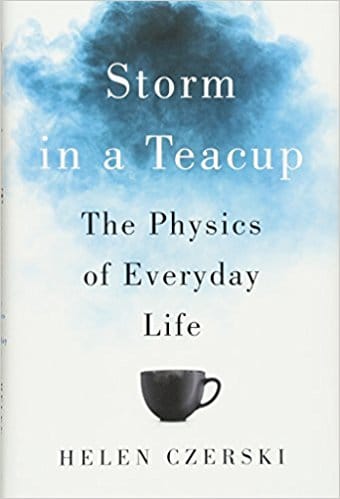While I was a university student, I spent a while doing physics revision at my Nana’s house. Nana, a down-to-earth northerner, was very impressed when I told her I was studying the structure of the atom.
“Ooh,” she said, “and what can you do when you know that?”
It is a very good question.
—Helen Czerski
When I was in school, I got through my science classes. To suggest I did much more than that would be to stretch the truth near the point of breaking. I got through a fair number of biology classes and chemistry classes. An earth science class here and there, maybe even a whole class on plate tectonics (at least enough of it to understand some things about the earth’s crust and why digging a very deep hole in my back yard would not be a reasonable alternate mode of transportation to the Asian continent). To finish out my university science requirements, I dozed through a good number of lectures on botany. But never did I ever take a physics class, because getting through physics just seemed too impossible. Even so, I rely all day long on the laws of physics being what they are, from knowing when to apply the brakes to stop in time for a red light to instructing my aspiring adjuster school students on the proper angle to position their ladders when they are going to climb up on a roof.
In the introduction to her book Storm in a Teacup: The Physics of Everyday Life, physicist and oceanographer Helen Czerski says that “these days, we live on the shore of an ocean of knowledge, one with regular tsunamis that threaten our sanity. If you can manage your life as you are, why seek more knowledge and therefore more complications? The Hubble Space Telescope is all very nice, but unless it’s also going to look downward once in a while to find your keys when you’re late for a meeting, does it make any difference?”
It does make a difference, she argues, and encourages us to consider that “playing with the physical toys in the world around us is more than ‘just fun,’ even though I’m a huge fan of fun for its own sake. Science isn’t just about collecting facts; it’s a logical process for working things out.” As humans, Czerski says, “we get a lot of joy from satisfying our curiosity.” What’s more, “the physical principles you learn from playing also apply to new medical technologies, the weather, mobile phones, self-cleaning clothes, and fusion reactors.”
Through chapters that begin with a small, everyday object or phenomenon and work their way through to “the same patterns explaining some of the most important science and technology of our time,” Czerski invites us to join in a “romp through the physical world, showing how popcorn, coffee stains, and refrigerator magnets can shed light on [Robert Falcon] Scott’s expeditions, medical tests and solving our future energy needs.”
In Rumors of Water, L.L. Barkat encourages writers to “Learn the difference between a tangerine and a tangelo. Consider the variation in their blooms, and the place where their nectar beads.” Good writing comes in great part from the details we discover in our explorations. Join us for our next Tweetspeak book club, taking up Czerski’s invitation to a “romp through the physical world” in her playful, accessible approach to physics, and Barkat’s invitation to the tiny detail of the tangelo’s bloom as we explore together, learning why ducks don’t get cold feet and what is the “moment of catastrophe” when popping corn. We’ll play with words and science with some fun writing prompts along the way.
As Czerski says, and we’ve known all along at Tweetspeak, “The teacup is only the start.”
Our new book club on begins November 1, and we’ll read on the following schedule:
November 1: Ch. 1-3: Popcorn and Rockets, What Goes Up Must Come Down, and Small Is Beautiful
November 8: Ch. 4-6: A Moment in Time, Making Waves, and Why Don’t Ducks Get Cold Feet?
November 15: Ch. 7-9: Spoons Spirals and Sputnik, When Opposites Attract, and A Sense of Perspective
Photo by Lyle Vincent, Creative Commons license via Flickr. Post by LW Lindquist.
- Earth Song Poem Featured on The Slowdown!—Birds in Home Depot - February 7, 2023
- The Rapping in the Attic—Happy Holidays Fun Video! - December 21, 2022
- Video: Earth Song: A Nature Poems Experience—Enchanting! - December 6, 2022


Sandra Heska King says
I signed up for (or had it assigned) physics in my senior year of high school. My teacher’s name was Mr. Tarbutton. He was really smart. I was really lost. When we had to decide on a project that first quarter, I thought I’d make a hammered dulcimer. Yeah… I dropped out of that class before I ever started it. Spent that hour in study hall. I probably need this book club.
Will Willingham says
I think it’s going to be fun. The author is quite engaging, and brings the subject to a fun and workable level.
Donna Falcone says
This looks really interesting. Time for a trip to the library! 🙂
Let’s romp!
I think this particular book will be very good for me. Thanks, LW.